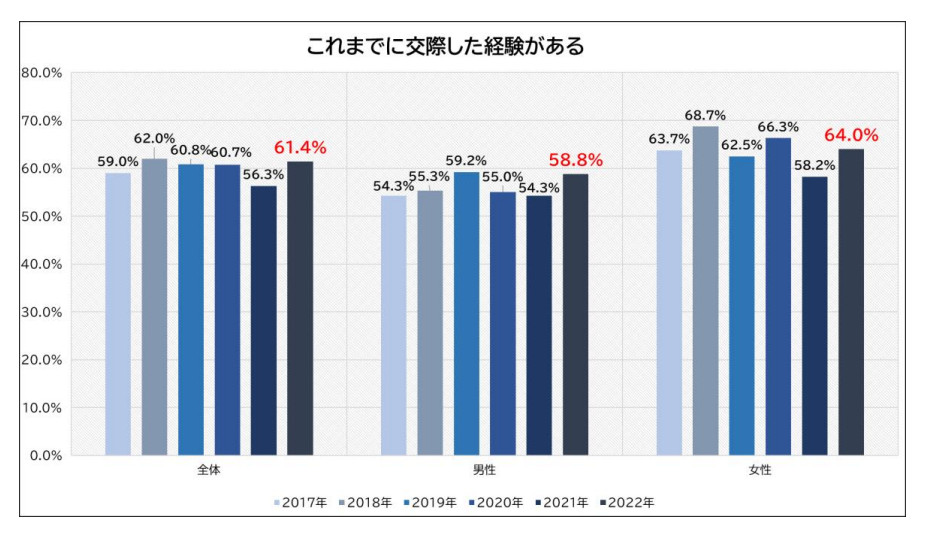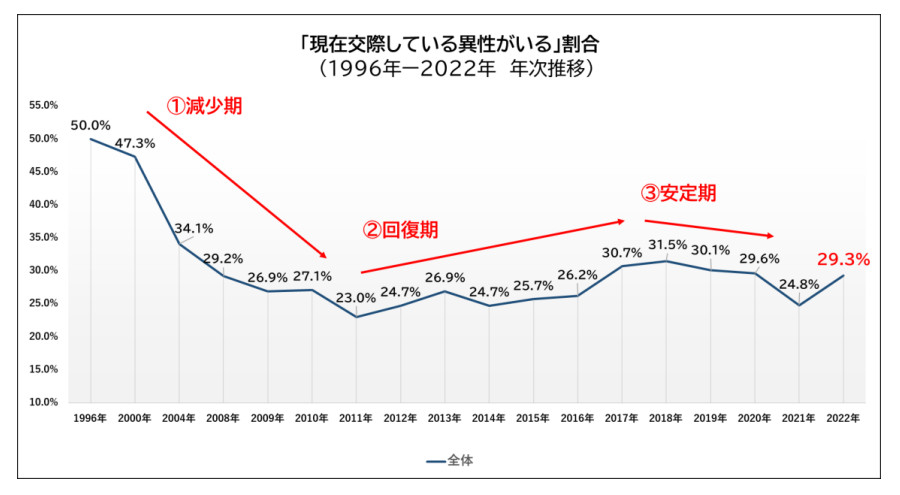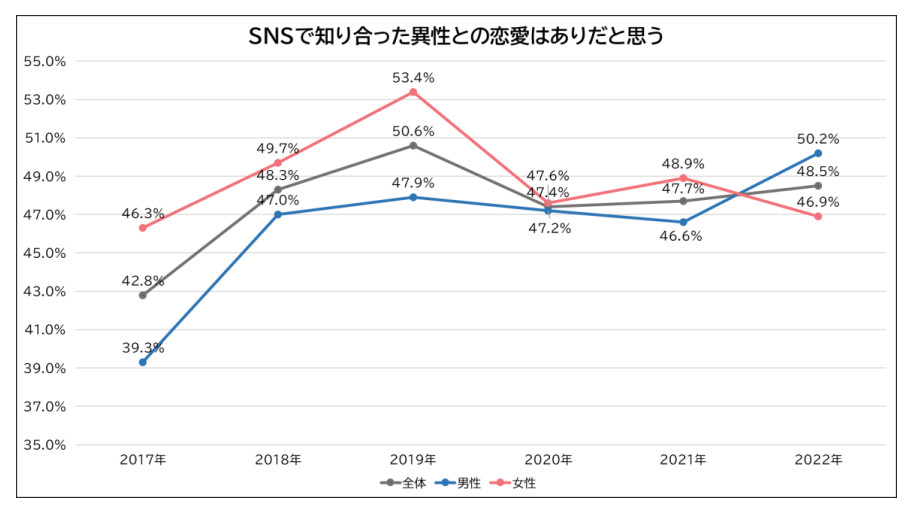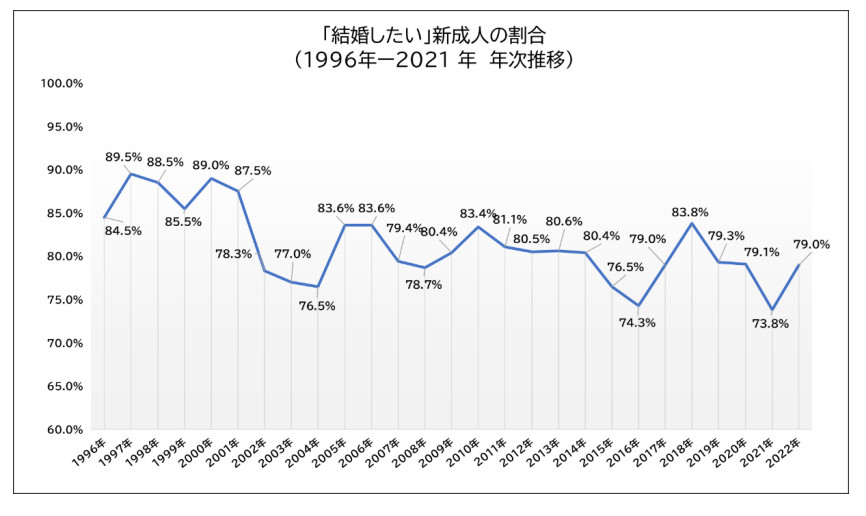
Marriage is on the table for many young people–but not as many as 26 years ago.
Japan is facing a number of societal problems, at the forefront of which is the declining birth rate and aging population. With fewer and fewer babies and generations of young people less interested in marriage, the country is soon going to have a hard time sustaining its rapidly growing elderly population, leading to even more problems.
But it’s not all bad. A recent survey conducted by marriage-minded matchmaking company O-net revealed that most Japanese young people just coming of age are still planning to get married and have children. 618 people born between April 2, 2001, and April 1, 2002, who are all either already 20 or turning 20 this spring (which is the legal age of adulthood), were surveyed in O-net’s annual Survey of Awareness of Love and Marriage, which they’ve been conducting for 26 years. The survey is used to view how new adults approach relationships and marriage, and to see how their approaches might be affected by current economic factors, social movements, and other conditions, and whether they’ve changed over time.
This year’s survey shows a general increase in positive attitudes toward dating, marriage, and children compared to last year’s. However, last year’s participants were surveyed during the height of the pandemic, so the climate of social distancing and staying home may have affected many participants’ answers. When asked “Have you ever been in a relationship?” This year, 61.4 percent of all respondents said yes, which is the highest percentage in three years. Last year only 53.6 percent of respondents answered “Yes”. Interestingly, more women than men answered “Yes” (64 percent for women, compared to 58.8 for men).
▼ Responses for “Have you ever been in a relationship before?” from all respondents (left group), men (center group) and women (right group). Columns from left to right show figures by year from 2017 to 2022.

However, just because they had experience doesn’t mean they’re currently seeing anyone, as only 29.3 percent of respondents answered “Yes” to the question “Are you dating anyone of the opposite sex right now?” 29.3 percent may seem like quite a low number, but it’s quite high compared to the last 10 years. The highest number of participants who said they had a partner was 50 percent in 1996, a number that steadily declined for 15 years until hitting its lowest point in 2011. Many suspect this is because of the increase of “herbivore men” during this period, and young people’s general lack of interest in sex. Starting in 2011, however, the number of participants who said they had a partner at the time of the survey rebounded slightly and has remained relatively stable over the last six years, excluding the drop in 2021.
▼ Percentage of “I’m currently dating someone of the opposite sex” answers from 1996 to 2022

Of the 181 people who had a partner at the time of the survey, the largest percentages met their partner at school.
How did you meet your current opposite-sex partner?
● At school (preschool-high school): 30.4 percent of respondents
● At school (university, graduate school, trade school): 26 percent
● Online (social media, apps): 14.4 percent
● At my part-time job: 8.8 percent
● Outside of school (club activities, hobbies, etc): 7.7 percent
● Introduced by a friend:4.4 percent
● Someone at full-time work or related to my work: 3.3 percent
● Mixer party: 0.6 percent
● Other: 4.4 percent

Surprisingly, the third most popular answer was “I met them online (social media/apps),” which beat out last year’s number-three answer, “I met them at work”, by 6 percentage points. Experts estimate that this number increased due to the social distancing measures required during the height of the pandemic.
In fact, quite a few young people are receptive to finding love online. 48.5 percent of respondents answered yes to the question, “Do you think you could fall in love with a person of the opposite sex you met online?” This number hasn’t really changed in the last two years, though it saw a big increase between 2017 and 2019. In particular, more men seem receptive to the idea, as 50.2 percent of male respondents answered “Yes”, which is the highest number in five years. This year also marks the first time a greater ratio of men than women would be receptive to an online relationship.
▼ “Do you think you could fall in love with a person of the opposite sex you met online?” (Gray for all, blue for men, and red for women)

After concluding the section on relationships, participants were then asked about marriage. The first question was, “Do you want to get married in the future?”. 79 percent of respondents picked either “I want to get married soon” or “I want to get married eventually”, an increase from last year, though this percentage is similar to the results from two years ago, right before the pandemic got started in Japan. Interestingly, almost the exact same percentage of men (79 percent) and women (78.9 percent) selected one of these two answers, though more women than men wanted to get married soon (24.9 percent of women compared to 17.5 percent of men).
Unsurprisingly, the number of respondents who want to get married has been in a zigzagging but overall decline since 1997, when 89.5 percent of young adults wanted to get married. The popularity of marriage appears to have had peaks and valleys since then, bouncing between the mid-70s to the mid-80s for 25 years. The lowest percentage of those wanting to get married (73.8 percent) occurred last year, perhaps because participants didn’t hear that the divorce rate dropped during quarantine.
▼ Percentage of new adults who want to get married (1996-2022)

When asked, “Why do you want to get married?” the top answers were, “Because I want to be with the person I love,” “I think I’ll be happy if I have a family, and “I want children.” These were the top three answers last year, as well.
Why do you want to get married?
● I want to be with the person I love: 63.9 percent of respondents
● I think I’ll be happy if I have a family: 52.5 percent
● I want children: 49.8 percent
● I want to my parents to have peace of mind: 21.7 percent
● I want financial/emotional security: 16 percent
● I want to live independently from my parents: 11.7 percent
● Getting married someday just seems obvious: 5.5
● I want to watch over the household as a housewife/househusband: 2.7 percent
● Other: 1.4 percent

The 488 people who responded that they would like to get married, either sooner or later, were then asked “At what age do you want to get married?” 25 was the most-picked answer, from 21.1 percent of the respondents. This was comparable to previous years, so it seems the ideal age for marriage hasn’t changed much recently. Overall, getting married between the age of 25 and 30 was ideal for most people, as 77 percent of respondents answered one of those ages. Women tended to pick younger ages than men; more women selected age 26 or under, while more men chose 27 and older, so it seems men are less concerned with age than women are.
Perhaps that’s because women are concerned about birthing children since it’s widely believed that the older you are, the more likely you are to have a complicated pregnancy or birth. Overall, 65.2 percent of respondents answered “Yes” when asked, “Do you want children after getting married?” These numbers didn’t vary so much between the genders: 62.5 percent of men and 68 percent of women answered “Yes.” These numbers are higher than last year but otherwise are the lowest percentages since 2017. Furthermore, 22.5 percent of respondents answered “I don’t know”, indicating that a lot of young people just aren’t certain enough about the future to be sure children are something they want.

Overall, the data indicates a long-term decrease in the number of young people who want to get married and have children, which are numbers the Japanese government needs to watch if they want to keep their country afloat in the next few decades. However, the numbers aren’t as bad as it sometimes feels, as they seem to be stabilizing the last few years (with the exception of the uncertainties of the pandemic) so hopefully, there can be a turnaround soon!
Regardless, whether you want to get married or not, have an interest in relationships or not, or are thinking about kids or not, either way, it’s A-OK! Live the life you want. Just remember, though: if you want to get married, you have to let the other person know first. Because marriage is an agreement between two consenting adults. Okay? Okay.
Source: O-net via University Journal Online via Otacom
Top image: Pakutaso
Insert images: O-net, Pakutaso (1, 2, 3,)
● Want to hear about SoraNews24’s latest articles as soon as they’re published? Follow us on Facebook and Twitter!

No hay comentarios:
Publicar un comentario